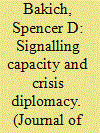| Srl | Item |
| 1 |
ID:
107904


|
|
|
|
|
| Publication |
2011.
|
| Summary/Abstract |
Under what conditions can leaders achieve wartime political-military integration? In the Vietnam War, political-military integration exhibited dramatic variation: in the air war, the US was able to tightly integrate its political objectives and military conduct, but in the ground war, the American military prosecuted a strategy that was both divorced from broader political objectives and was immune from Washington's influence. I argue that the nature of information management between the military and civilian leadership explains the pattern of political-military integration in the Vietnam War more completely than do explanations that focus on the organizational cultures of professional militaries.
|
|
|
|
|
|
|
|
|
|
|
|
|
|
|
|
| 2 |
ID:
186900


|
|
|
|
|
| Summary/Abstract |
In the 2017 U.S.-North Korea nuclear crisis, the Trump administration’s ‘maximum pressure’ strategy failed to achieve its objectives of the complete, irreversible, verifiable denuclearization (CVID) of the DPRK, and induced escalation pressures that brought the two countries to the brink of war. A deficit in signalling capacity (i.e. biased intelligence portfolio, lack of diplomatic-military integration, and inflexible military doctrine and war plans) prevented Washington from managing the crisis, creating the conditions for its strategic failure. The signalling capacity framework offers a comprehensive approach to explaining the outcome of the 2017 crisis, outperforming audience cost and brinkmanship theories.
|
|
|
|
|
|
|
|
|
|
|
|
|
|
|
|
| 3 |
ID:
101333


|
|
|
|
|
| Publication |
2010.
|
| Summary/Abstract |
To many scholars and policymakers, 'partition' offers the most efficacious means of resolving ethnic-civil wars. Others reject partition as a solution, citing flaws (both logical and empirical) and harmful international implications should such an approach become commonplace. What has been missing from this debate is an understanding of how the process of partition unfolds. In this article we examine such a process, the case of the Krajina in the war in Yugoslavia, 1994-1995. The US aligned itself with Croatia against Serbs rebelling in the Krajina region of Croatia. The culmination of this alignment occurred in August 1995 when Croatian forces initiated 'Operation Storm' (Oluja) against Croatian Serb insurgents. Croatian forces effectively cleansed the Krajina of its Serbian population. Eager to initiate a diplomatic peace process, Washington welcomed the Croatian operation, and largely because of Operation Storm, negotiations at Dayton became possible.
|
|
|
|
|
|
|
|
|
|
|
|
|
|
|
|